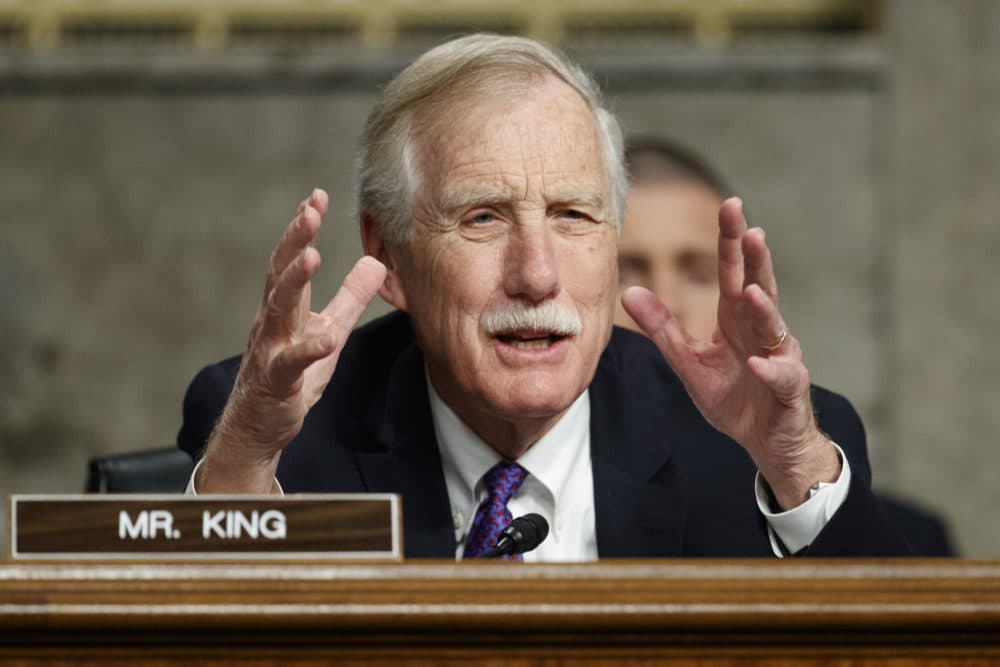Advertisement
'I Don't Think He Was Correct,' Sen. Angus King Says Of Barr's Obstruction Conclusion

The redacted version of the Mueller report is now public. Hundreds of pages laying bare how Russia interfered in the 2016 election and documenting a White House defined by chaos, bullying and deceit, along with a president determined to foil the investigation. And yet, President Trump and his team declared victory.
Before the report was even released, Attorney General William Barr echoed the president’s refrain "no collusion."
A lot of legal observers — and Democrats — say otherwise, including House Judiciary Chairman Jerry Nadler.
"The special counsel made clear that he did not exonerate and the President, and the responsibility now falls to Congress to hold the President accountable for his actions," he said.
Rep. Nadler, D-N.Y., Friday morning issued a subpoena for the full, unredacted report.
Friday, On Point, we heard reaction from Sen. Angus King, I-Maine, who serves on the Senate Intelligence and Armed Services Committees.
Interview Highlights
On what we learned from the report
"The Mueller reports is basically divided up into two pieces: one is on the whole collusion/cooperation/conspiracy issue, and the second part is on the obstruction issue, which ironically grew out of the initial investigation. I think there's one point that the report makes very clear, and that is — and this has been you sort of a conspiracy theory, a lot of discussion particularly on the right — that somehow the whole counterintelligence investigation into the Trump campaign was illegitimate and it started with the 'Steele dossier.' And the truth is, it started with a guy who was working in the Trump campaign talking to the ambassador of Australia, saying the Russians have dirt on Hillary Clinton. And the combination of him being in the Trump campaign and that Russians have dirt, and then very shortly thereafter, there was a big dump of hacked emails — that's when the FBI took steps to say, 'Wait a minute, this is something we've got to look into and we have to take seriously.' So that's where it started. The Steele dossier didn't get to the FBI until something like September. This was in July of 2016. So that's the kind of detail that is in here that I think is going to be important in the ongoing discussion of this whole matter."
Advertisement
"The Senate Intelligence Committee has not completed our work. We've interviewed over 100 witnesses, thousands of pages of testimony, and we're still following up on on some of these matters."
Sen. Angus King
On reporting that "Senate Intelligence Chairman Richard Burr apparently supplied the White House counsel’s office with information about the Russia probe"
"Well, I want to get more detail. It was the first I'd heard of that. It's concerning, obviously. It was very early in the process. I have to say, you know, I meet with Richard Burr twice a week for four or five hours and along with the other members of the committee. It's inconsistent with the way he's conducted himself pretty much throughout this investigation. I want to understand it better. It's concerning if it happened. But the question is, 'Was it an ongoing cooperation with the White House or was this an aberration?' I hope it's the latter. And obviously it's something we have to talk about in the committee."
On the next steps for Congress
"I do think that there are still some open matters that need to be examined. In our committee, by the way, the Senate Intelligence Committee has not completed our work. We've interviewed over 100 witnesses, thousands of pages of testimony, and we're still following up on on some of these matters.
"There are two things in the collusion part of the report that struck me as sort of an undefined. One was [former Trump campaign chairman] Paul Manafort, according to the report, on more than one occasion supplied polling data and information about the campaign to a guy who was identified by the FBI as having connections to Russian intelligence. This was in August and September of 2016. And so my question is what was he sharing and and why? The public hears polling data and they think, 'Well, that means Trump was up by four. Hillary's up by six.' No, polling data has things like which issues are working in which states and the extent of the detail. To me, that would have been very significant in terms of guiding the Russian efforts, which, by the way, the report makes crystal clear. The Russians were behind these efforts of disinformation and release of hacked emails. But the fact that that polling data — I was not satisfied with the provision in the report that I felt didn't examine that in sufficient detail.
"The other piece is there's a lot of redaction in that section that appears to be the Roger Stone material. It says 'in a pending matter,' and it looks like it's Roger Stone. And I want more clarity on that in the sense that he appears — and again I'm saying appears — to have been a potential connection between the campaign and WikiLeaks. And to me that's a dot that hasn't yet been connected. For example, the very day of the Access Hollywood tapes ... within hours of that, WikiLeaks dumped a huge amount of John Podesta's emails. Was that just a coincidence or did somebody call and say 'we need some help here'?
"I think there also the questions of obstruction of justice. Mueller sort of passed that over to the Congress. Bill Barr intercepted the pass and concluded on it, but I don't think he was correct. But the question now before us is what do we do? My view is we wait until the elections of 2020. That's the ultimate people having the say over who they want as their president."
Alex Schroeder adapted this interview for the web.

